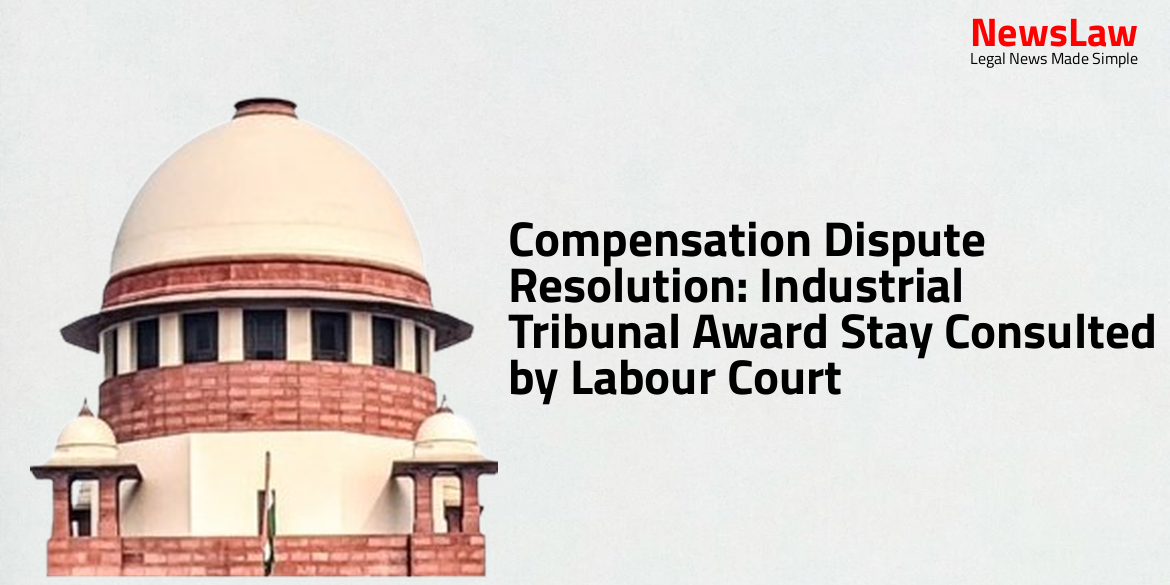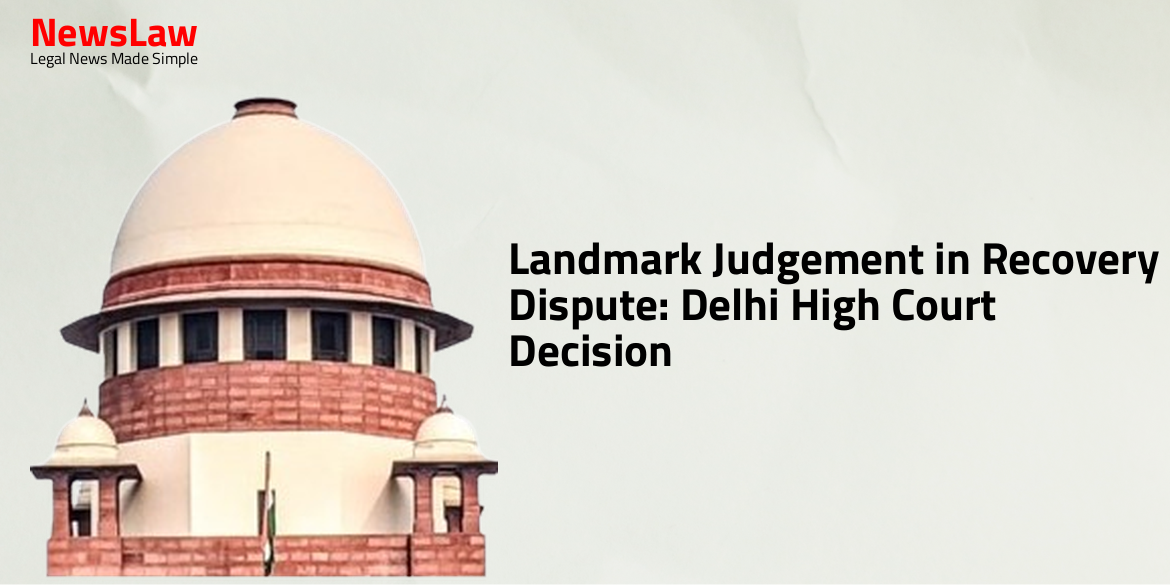In a recent judgment by the Delhi High Court, the resolution of a compensation dispute involving the Industrial Tribunal award stay was examined by the Labour Court. The case presents a crucial analysis of the intricacies surrounding compensation and the impact of stayed awards on such disputes. Stay tuned to delve into the details of this significant legal battle.
Facts
- The Labor Court failed to recognize that the workman has consistently received payment according to the unskilled nature of his work and never raised any objections during his employment.
- The judgment of the Industrial Tribunal does not designate the workman as ‘skilled’ based on the scheduled employment and minimum rates of wages for the relevant industry.
- The workman has been receiving wages prescribed for unskilled labor, indicating acceptance of his job classification.
- The Labor Court incorrectly referenced unrelated judgments in its decision, misinterpreting their applicability to the present case.
- The urgency to seek a stay in the Writ Petition was lacking, as indicated by the delay in filing and lack of action on the part of the Union.
- The stay orders from the High Court should have prevented the implementation of the Industrial Tribunal’s award, which was stayed.
- The Petitioner Management explicitly requested a stay pending the designation matter resolution, which the Labor Court failed to acknowledge.
- The potential nullity of the impugned award if the designation matter is decided in a manner contradicting the current decision.
- The Labour Court determined that Sections 9A and 25-N of the Act were not applicable to the case.
- The claimant did not work with the management from the date of transfer until rejoining, entitling him to retrenchment compensation as per Section 25-F for the period actually worked.
- A previous order declaring the transfer of 20 workers illegal was stayed by the Delhi High Court in 2006.
- The service of the claimant was retrenched after several years despite the stay order.
- The Labour Court awarded the claimant a lump-sum compensation of Rs.200,000 (Rupees Two Lakhs only), plus 9% interest per annum until payment.
- The decision favored the claimant as the management failed to provide the entitled compensation within the specified time frame.
- Reinstatement was not feasible due to the impending closure of the management, thus the claimant was granted wages of the skilled/semi-skilled category by the Labour Court.
- An argument for inadequate retrenchment compensation due to the stay order on back wages was also addressed and dismissed by the court.
- The management calculated retrenchment compensation based on the last drawn salary of the claimant, not considering the skilled and semi-skilled worker wages designated by the POIT on 29.09.2009.
Issue
- Issue No. 2 in the case pertains to whether the stayed award of the Industrial Tribunal could be relied upon by the Labour Court to determine the entitlement to compensation.
- The Workman in question was receiving the salary of an ‘unskilled’ laborer from the date of appointment until the time of retrenchment.
- The key question under issue no. 2 is the reliance on the stayed award by the Labour Court for awarding compensation to the Workman.
- The court must consider whether the impugned award by the Labour Court should be challenged under Article 226 of the Constitution of India.
Arguments
- The petitioner argues that the award passed by the Labour Court was based on an earlier award dated 29 September, 2009, which was stayed by the court in a writ petition.
- The petitioner contends that if there was any amount due to the worker based on a dispute in the designation matter, it could be paid once the designation matter is resolved.
- The petitioner emphasizes that the workman had been receiving the salary of an unskilled laborer without objection and had not raised any concerns about his designation earlier.
- The petitioner criticizes the Labour Court for not considering the stay order from the court in the designation matter when passing the impugned award.
- The petitioner argues that the compensation awarded in the impugned award was based on the designation given to the workman in the 2009 award.
- The petitioner highlights that the workman was retrenched illegally while the 2009 award was in operation, and the subsequent 2017 award was passed after due discussion on the legal aspects.
- The petitioner suggests that the Labour Court erred in its application of certain legal judgments, as the facts of those cases differ from the present matter.
- Granting designation to the claimant has been stayed by the AR as they correctly calculated retrenchment compensation and notice pay based on last drawn wages, not the previous award.
- Earlier, the claimant challenged a transfer and was classified to be doing unskilled work by the POIT, with an award that was not contested further and hence stands as final and binding under res-judicata.
Analysis
- The learned Labour Court held that the management erred in not calculating notice pay and compensation as per the 2009 award.
- The management failed to include the service length while calculating retrenchment compensation.
- The designation awarded by the Industrial Tribunal in 2009 was not appropriately considered during retrenchment compensation calculations.
- The seniority list and attendance register provided by the management were crucial in determining the violation of Section 25-F of the Act.
- The POIT observations in a transfer case were not held as res judicata in the designation case.
- The representation of the claimant as skilled or semi-skilled worker was integral to the compensation calculation.
- The management did not properly categorize the claimant’s wages which resulted in inadequate compensation and violation of Section 25-F.
- The designation matter that was stayed in 2013 did not affect the compensation rights of the claimant during the 2010 retrenchment.
- The Petitioner’s argument that the designated compensation was wrongly awarded due to the stay order was rejected by the Court.
- The violation of Section 25-F by the management was clearly demonstrated through the mishandling of compensation and designation categories.
- Section 144 CPC provides for variation, reversal, setting aside, or modification of a decree.
- Restitution is the obligation of the court to restore parties to the same position they would have been in without the interim orders if the final decision goes against the party successful at the interim stage.
- Successful party at the end can demand the benefit earned by the opposite party under the interim orders lost, unless the court finds that restitution would defeat the ends of justice.
- Judicial precedence in cases like Nava Bharat Ferro Alloys Limited v. Transmission Corporation of Andhra Pradesh Limited and State of Rajasthan v. J.K. Synthetics Limited emphasizes the principle of restitution.
- Dismissal of a writ petition or the final decision reverses the interim relief granted, leading to the obligation to restore parties to their original positions.
- The judgment in Shree Chamundi Mopeds Ltd articulates the duty of the court to restore parties to their pre-interim stage positions upon dismissal of the substantive proceeding.
- An example highlighting the distinction between quashing and suspension of laws leads to different consequences regarding payments and post-dismissal obligations.
- Pendency of a writ petition/suit or proceeding ends with the dismissal of substantive proceedings, requiring parties to be placed in their original positions.
- Section 25-F of the Act outlines conditions for retrenchment of a workman.
- Employer must give one month’s notice in writing or pay wages in lieu of notice.
- Employer is obligated to pay compensation equivalent to fifteen days average pay for every completed year of continuous service or any part thereof exceeding six months.
- Notice to appropriate government is necessary for a valid compensation claim under this section.
- Workman must have been in continuous service for at least one year with the employer.
- The Court found no merit in the petitions and upheld the findings of the Labour Court.
- The petitioner management failed to present any compelling arguments in their favor.
- The Labour Court consistently found that the retrenchment of workmen by the petitioner management was illegal due to insufficient compensation based on their designation.
Decision
- Management ordered to pay Rs.2,00,000/- to the worker within one month.
- Interest of 9% per annum to be charged if payment is delayed.
- Parties to bear their own costs.
- Copies of the award to be sent to the Govt. of NCT of Delhi for publication.
- File to be archived in the record room.
Case Title: SAWHNEY RUBBER INDUSTRIES Vs. SH . CHANDER PRAKASH PATHAK (2024:DHC:4569)
Case Number: W.P.(C)-7967/2020



